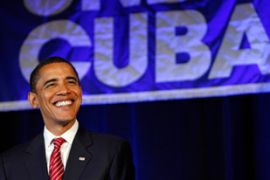US debates lifting Cuba travel ban
Senators push for end of ‘anachronistic ban’ they feel helps the Cuban regime.

The senators have charged that the travel ban, imposed in the aftermath of the 1959 Cuban revolution that swept Fidel Castro to power, had hurt US efforts to promote democratic reforms in the Socialist-run island.
Negative effect
They said the travel ban “has left Washington an isolated bystander, watching events on the island unfold at a distance”.
“Isolation from outside visitors only strengthens the Castro regime,” they added.
Ending the restrictions would allow US citizens, “who serve as ambassadors for the democratic values we hold dear,” visit the island and would “help break Havana’s choke hold” on information, they said.
 |
| Raul Castro has been accused of employing repressive measures against critics [AFP] |
Tom Ackerman, Al Jazeera’s correspondent in Washington DC said: ” This is the opening shot by the proponents of ending the ban. They think this is the best chance they’ve had in years to drop the ban on all Americans travelling to Cuba.
Juan Jacomino, a Cuban journalist in Havana, told Al Jazeera: “The embargo in general needs to be changed. Cubans recognise this as a failed policy. It’s un-American to keep a policy in place that doesn’t work.
“Specifically, the travel ban is one of the absurdities of the policy. We are only 90 miles away and we have more than a million Cubans in the US.
“Americans are allowed to go to Libya, North Korea … anywhere in the world, and not to Cuba. There is no animosity for Americans, despite nearly fifty years of hostility between the governments.”
Cuban repression
Meanwhile, a rights group has said that conditions in Cuba under President Raul Castro are much the same, if not worse, than when Fidel was president.
Human Rights Watch said in a report issued on Wednesday that Raul Castro has kept the system his brother Fidel used to repress critics, refusing to free scores of people imprisoned years ago and jailing others for “dangerousness”.
Fidel Castro temporarily ceded power to his younger brother Raul in July, 2006, and formally stepped aside as president last year because of illness.
Raul Castro has relied in particular on a Cuban law that lets the state imprison people even before they commit a crime, Human Rights Watch said.
Barack Obama, the US president, has said that any further easing of restrictions on Cuba would be tied to Cuban reciprocation by releasing poliltical prisoners, allowing US telecommunications companies to operate on the island and by dropping taxes on cash remittances to Cubans.